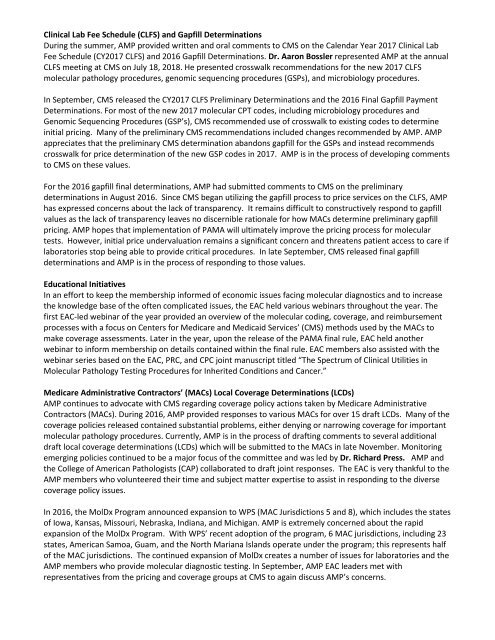AMP 2016 Committee and Subdivision Annual Reports
RiNx305S5yz
RiNx305S5yz
You also want an ePaper? Increase the reach of your titles
YUMPU automatically turns print PDFs into web optimized ePapers that Google loves.
Clinical Lab Fee Schedule (CLFS) <strong>and</strong> Gapfill Determinations<br />
During the summer, <strong>AMP</strong> provided written <strong>and</strong> oral comments to CMS on the Calendar Year 2017 Clinical Lab<br />
Fee Schedule (CY2017 CLFS) <strong>and</strong> <strong>2016</strong> Gapfill Determinations. Dr. Aaron Bossler represented <strong>AMP</strong> at the annual<br />
CLFS meeting at CMS on July 18, 2018. He presented crosswalk recommendations for the new 2017 CLFS<br />
molecular pathology procedures, genomic sequencing procedures (GSPs), <strong>and</strong> microbiology procedures.<br />
In September, CMS released the CY2017 CLFS Preliminary Determinations <strong>and</strong> the <strong>2016</strong> Final Gapfill Payment<br />
Determinations. For most of the new 2017 molecular CPT codes, including microbiology procedures <strong>and</strong><br />
Genomic Sequencing Procedures (GSP’s), CMS recommended use of crosswalk to existing codes to determine<br />
initial pricing. Many of the preliminary CMS recommendations included changes recommended by <strong>AMP</strong>. <strong>AMP</strong><br />
appreciates that the preliminary CMS determination ab<strong>and</strong>ons gapfill for the GSPs <strong>and</strong> instead recommends<br />
crosswalk for price determination of the new GSP codes in 2017. <strong>AMP</strong> is in the process of developing comments<br />
to CMS on these values.<br />
For the <strong>2016</strong> gapfill final determinations, <strong>AMP</strong> had submitted comments to CMS on the preliminary<br />
determinations in August <strong>2016</strong>. Since CMS began utilizing the gapfill process to price services on the CLFS, <strong>AMP</strong><br />
has expressed concerns about the lack of transparency. It remains difficult to constructively respond to gapfill<br />
values as the lack of transparency leaves no discernible rationale for how MACs determine preliminary gapfill<br />
pricing. <strong>AMP</strong> hopes that implementation of PAMA will ultimately improve the pricing process for molecular<br />
tests. However, initial price undervaluation remains a significant concern <strong>and</strong> threatens patient access to care if<br />
laboratories stop being able to provide critical procedures. In late September, CMS released final gapfill<br />
determinations <strong>and</strong> <strong>AMP</strong> is in the process of responding to those values.<br />
Educational Initiatives<br />
In an effort to keep the membership informed of economic issues facing molecular diagnostics <strong>and</strong> to increase<br />
the knowledge base of the often complicated issues, the EAC held various webinars throughout the year. The<br />
first EAC-led webinar of the year provided an overview of the molecular coding, coverage, <strong>and</strong> reimbursement<br />
processes with a focus on Centers for Medicare <strong>and</strong> Medicaid Services’ (CMS) methods used by the MACs to<br />
make coverage assessments. Later in the year, upon the release of the PAMA final rule, EAC held another<br />
webinar to inform membership on details contained within the final rule. EAC members also assisted with the<br />
webinar series based on the EAC, PRC, <strong>and</strong> CPC joint manuscript titled “The Spectrum of Clinical Utilities in<br />
Molecular Pathology Testing Procedures for Inherited Conditions <strong>and</strong> Cancer.”<br />
Medicare Administrative Contractors’ (MACs) Local Coverage Determinations (LCDs)<br />
<strong>AMP</strong> continues to advocate with CMS regarding coverage policy actions taken by Medicare Administrative<br />
Contractors (MACs). During <strong>2016</strong>, <strong>AMP</strong> provided responses to various MACs for over 15 draft LCDs. Many of the<br />
coverage policies released contained substantial problems, either denying or narrowing coverage for important<br />
molecular pathology procedures. Currently, <strong>AMP</strong> is in the process of drafting comments to several additional<br />
draft local coverage determinations (LCDs) which will be submitted to the MACs in late November. Monitoring<br />
emerging policies continued to be a major focus of the committee <strong>and</strong> was led by Dr. Richard Press. <strong>AMP</strong> <strong>and</strong><br />
the College of American Pathologists (CAP) collaborated to draft joint responses. The EAC is very thankful to the<br />
<strong>AMP</strong> members who volunteered their time <strong>and</strong> subject matter expertise to assist in responding to the diverse<br />
coverage policy issues.<br />
In <strong>2016</strong>, the MolDx Program announced expansion to WPS (MAC Jurisdictions 5 <strong>and</strong> 8), which includes the states<br />
of Iowa, Kansas, Missouri, Nebraska, Indiana, <strong>and</strong> Michigan. <strong>AMP</strong> is extremely concerned about the rapid<br />
expansion of the MolDx Program. With WPS’ recent adoption of the program, 6 MAC jurisdictions, including 23<br />
states, American Samoa, Guam, <strong>and</strong> the North Mariana Isl<strong>and</strong>s operate under the program; this represents half<br />
of the MAC jurisdictions. The continued expansion of MolDx creates a number of issues for laboratories <strong>and</strong> the<br />
<strong>AMP</strong> members who provide molecular diagnostic testing. In September, <strong>AMP</strong> EAC leaders met with<br />
representatives from the pricing <strong>and</strong> coverage groups at CMS to again discuss <strong>AMP</strong>’s concerns.



